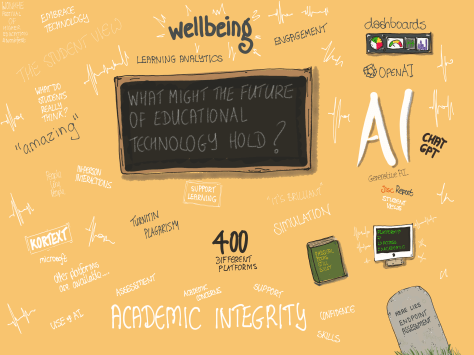I have been working on a series of visions about how universities could be working differently in the future. The aim of the visions is not to predict a future, but to provide an insight into a possible view of what that future could look like and think about how these impact on your current position and thinking. We did something similar for Learning and Teaching Reimagined, and though I wasn’t personally credited with the authorship of some of the visions, I did create and write the visions. I tested them out with a few people and got the reaction I wanted as well as stimulating an interesting discussion.
One of those visions was about organisations merging. Coincidently in the news this week was the news that City, University of London and St George’s, University of London have agreed a merger – the new institution will be called City St George’s, University of London and commence operations from 1 August, “though full integration will take longer.” Current City president Anthony Finkelstein will lead the combined institution.
There has been much talk about the four day week, in the Guardian this week was an article on how some firms have made their four day week trials permanent.
Most of the UK companies that took part in the world’s biggest ever four-day working week trial have made the policy permanent, research shows.
Reports from more than half the pilot organisations said that the trial, in which staff worked 100% of their output in 80% of their time, had a positive impact.
For 82% this included positive effects on staff wellbeing, 50% found it reduced staff turnover, while 32% said it improved job recruitment. Nearly half (46%) said working and productivity improved.
TASO published a new report: Using learning analytics to prompt student support interventions.
How can learning analytics – data systems that help understand student engagement and learning – be used to identify students who may be at risk of withdrawing from their studies, or failing their courses, and what interventions work to re-engage students in their studies?
The key findings from the report were:
- Neither HEP found a measurable difference in post-intervention engagement rating between at-risk students who received an email followed by a support phone call and at-risk students who received only the email.
- Neither HEP found any significant impact of the additional support call on the likelihood of a student generating additional at-risk alerts.
- Qualitative feedback indicated that students welcomed the intervention. For some, the phone call was appreciated as a means of breaking down barriers between themselves and the institution and stimulating their re-engagement with learning. For others, the email alone was cited as a sufficient motivator to re-engage with learning.
There was an article on Wonkhe on the report.
A new study from TASO seeks to judge “what works” in the use of learning analytics for student support, exploring whether students identified by engagement data as being “at risk” were better supported by email and phone contact or email alone. Large cohorts of students at two providers, Sheffield Hallam University and Nottingham Trent University, were divided into two random groups. In both cases, it was found that an additional support call created no measurable difference in at-risk students’ subsequent engagement and no appreciable change in the likelihood of the student generating subsequent alerts.
It will be crucial to robustly test the impact of any wellbeing interventions that analytics systems may trigger.
 As many people already well known, the environmental costs of generative AI is soaring, and that also being kept mostly secret. In Nature is an article about the impact AI will have on energy systems.
As many people already well known, the environmental costs of generative AI is soaring, and that also being kept mostly secret. In Nature is an article about the impact AI will have on energy systems.
Last month, OpenAI chief executive Sam Altman finally admitted what researchers have been saying for years — that the artificial intelligence (AI) industry is heading for an energy crisis. It’s an unusual admission. At the World Economic Forum’s annual meeting in Davos, Switzerland, Altman warned that the next wave of generative AI systems will consume vastly more power than expected, and that energy systems will struggle to cope.
Spent some time planning out Senior Education and Student Experience Group meeting for March.
Wrote a briefing update on the work I have been doing on the optimisation of operations and data work.
Had an interesting and informative conversation with a college about their smart campus aspirations.
Spent time planning next steps of my Intelligent Campus work.
Planning a meeting with an university for a follow up workshop on their smart campus planning, after successful workshop in January and their request for a 1-2 day cross university workshop.
Worked on creating and planning blog ideas in the personalisation space. Also worked on creating and planning senior management primer ideas in the personalisation space, and some use case ideas.
Spent time planning out ideas for Spaces events over the next 12 months.
Noted that this worknote represents five years of undertaking worknotes for the blog.













